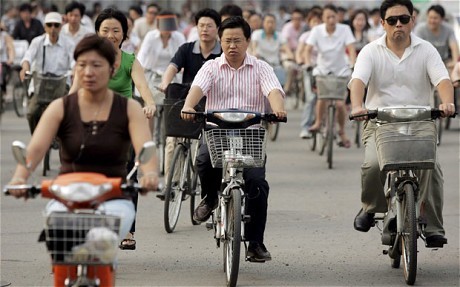
The humble bicycle, for decades the workhorse of the Communist proletariat, is this year's surprise fashion accessory in China.
The rivers of cyclists that used to flow through Chinese cities, all mounted on sturdy Flying Pigeon bikes and wearing monochrome Mao suits, have long dried up.
Instead, for two decades China has been a nation of drivers, embracing the car the point of gridlock and even outlawing bicycles from key thoroughfares in Shanghai.
But for a new generation of Chinese, inspired by the West and Japan, the bicycle is once again in vogue. This year, colourful custom-made bikes have adorned the shop windows of Shanghai's trendiest boutiques as well as advertising campaigns for brands like Lee and Levi's.
Groups of Chinese bike enthusiasts have also begun to organise midnight rides through the country's cities, when there is little traffic.
"In the last six months, if you look at all the Chinese lifestyle magazines, at least half of them have featured a bike on their front cover, or had a main feature about cycling," said Tyler Bowa, a Canadian who custom builds fixed gear bikes in Shanghai.
"Two years ago, when we started, there was nothing written anywhere about bikes and now there are forums on the internet with a million people a time talking about them and posting pictures of their bikes," he added.
"For men, owning a cool bike is the same as a woman owning a designer handbag. It completes their outfit. And there are lots of people who post pictures of themselves and their bikes on their web pages." Luxury bicycles made by Ferrari and Lamborghini have also proven popular. Xie Jian, a regional sales manager for Qida, the Chinese importer of the two brands, said at least one £34,000 Lamborghini bike sells each month in the wealthy south eastern city of Wenzhou.
"All sorts of people buy these luxury bikes," said Tong Jing, a saleswoman for Qida in Hangzhou. "Company bosses, office workers, movie stars, television actresses," she added.
UCC, a high-end Taiwanese company whose bikes sell for between £500 and £5,000, also sold out its consignment at a recent trade show. "We started in 2008 and sold 3,000 bikes," said Wu Yamou, the general manager of Rapid Trading, the importer.
"So far this year we have sold 50,000. They have become popular presents. In the future, people will stop thinking of bicycles as cheap and start thinking of them as a healthy and fashionable option.
In the south, there are already several thousand miles of green bike paths, connecting cities, making it good for weekend cycling."
At Chain's Sprockets in Shanghai, serious road racers and triathletes can buy sports bikes for monthly races in the city's suburbs. "Before, people did not have time for hobbies, but in the last five years, racing has become popular," said Chain Zou, the founder of the shop.
"Our bikes cost around 20,000 yuan (£2,000) and our sales are up 30 per cent this year." China was dubbed the "Kingdom of Bicycles" in the 1950s by the Communist party, which saw bikes as a low-cost solution to crammed public transport and made them one of the three "must-haves" of every household, alongside a sewing machine and watch.
Until the 1980s, a good bicycle was a sought-after status symbol and workers needed guanxi, or connections, to obtain the best brands: Flying Pigeon, Phoenix and Forever, all of which cost up to four months wages.
By the late 1990s however, one in four bicycles being turned out by the state-controlled factories was left unsold as Chinese fell in love with cars.
Mr Bowa's company, People's Bikes, started when he discovered a warehouse full of old Chinese bicycle frames and decided to turn them into modern fixed-gear models costing around 3,500 yuan (£350) each.
"It used to be that the standard gift to foreign ambassadors in China was a Phoenix bike or a Flying Pigeon. And then 30 years ago that just stopped," he said. "There was this lost generation of Chinese who wanted cars instead. And so we found this huge number of frames just sitting unused and unwanted. They stopped making them in the 1990s and just left them."
From Telegraph.co.uk
